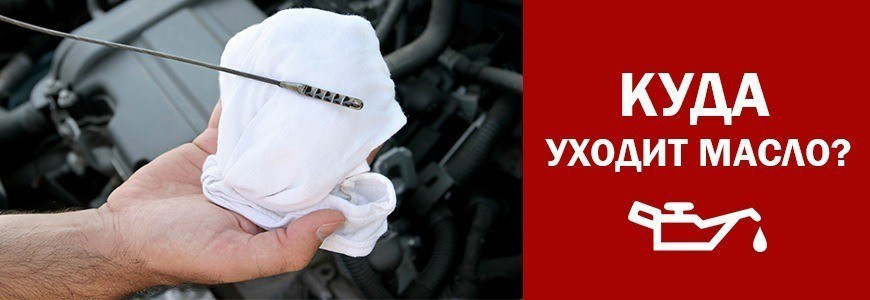Where does the oil go?

Did you know that checking the engine oil level requires certain rules? The best time to measure is 3 minutes after switching off the engine when the engine is warm. If you find you're running low on oil, there could be a number of reasons. Let's look at each one in detail.
Causes of excessive oil consumption
Oil excess
When oil is poured above the maximum allowable level, the rotating crankshaft whips it into foam, creating an oil mist. The accelerated crankshaft rotation causes the mist and foam to be ejected into the intake manifold. Even the adsorbers and separators of modern internal combustion engines are powerless against heavy emissions.
Conclusion – fill your engine oil within the allowance that the dipstick will tell you.
Andash; fill your engine oil within the allowance that the mark on the dipstick will tell you.
Wrong choice of lubricant
It is not worth experimenting on the engine and randomly select engine oil, because «everything has already been invented before us». Why spoil the engine with your own hands, forcing it to starve or work on wear and tear?
If you want the engine to serve long time «faithfully » and at the same time did not consume oil over the norm, when choosing the latter, take into account its type (semi-synthetic/synthetic/mineral), viscosity according to SAE and API quality category, recommended by the manufacturer of your car.
Excessive oil pressure
If the pressure reducing valve is defective, the lubrication lines are clogged, or the oil is too viscous, oil pressure builds up in the system, causing oil to leak through the engine's oil seals and gaskets.
Oil overpressurisation
All of these problems, with the exception of checking oil viscosity, can only be identified and repaired by a workshop technician, so don't wait for a miracle and call in the experts.
Unjustified savings
Modern branded oils have a complex chemical composition, so they can withstand the heavy loads and accompanying high temperatures of engine operation. They undergo a huge amount of laboratory research before being marketed.
Modern branded oils have complex chemical compositions so they can withstand the heavy loads and accompanying high temperatures of engine operation.
Counterfeit oils are only made to make a quick buck, so no additive complex or high-quality base can be expected.
When you want to save money on motor oil again, don't be surprised if it not only uses up quickly, but also causes engine damage.
Incomplete combustion
Faults in the fuel system, ignition system, ECU and its sensors, and the turbine (if any) disrupt the combustion process, or an over-enriched mixture enters the cylinders. As a result, there is excessive friction of elements of the cylinder piston group, which causes their increased wear. Also, unburned fuel residues can enter the crankcase, liquefying the oil and causing oil consumption.
If you notice that oil consumption has increased, spark plugs have turned black and engine performance has decreased, visit a car service to fix the above systems and mechanisms of the car and bring engine oil consumption back to normal.
Cylinder Deformation
If the cylinders are tapered or oval, if they are critically worn, you are assured of oil consumption. You can identify these faults by the following signs: loss of compression, bluish coloured exhausts.
Troubleshooting of this type of problems is carried out at the service station by complete disassembly of the engine and measuring the geometric parameters of the cylinders. Then they are bored, restoring the necessary geometry. We do not recommend that you do this work yourself.
Elevated crankcase gas pressure
Another cause of excessive oil consumption.
Any engine can have a crankcase gas burst. The culprit – excessive pressure built up in the crankcase. The result – oil gradually seeps into the cylinders through the valve guide sleeves. Also at increased pressure, oil mist bursts from the crankcase and can enter the intake manifold through the valve ventilation system and then into the cylinders.
To avoid this, check the crankcase ventilation system and the condition of the piston rings and cylinders.
Turbine malfunctions
Turbocharged engines have inherently high oil fluid consumption. When you frequently drive with the turbo on, the slide bearings wear out faster. This results in engine oil being sucked into the working space and then entering the combustion chamber.
The second disadvantage of turbocharged engines – clogging of the return line of the lubrication system, which leads to oil being forced into the working space and its overconsumption. So, try to keep the turbo on less often or have it serviced more often.
How to prevent excessive engine oil consumption:
- When buying a car or after an engine overhaul at the service station, run-in your «iron horse», and do not forget to look at the norms of oil consumption set by the manufacturer. If as a result of running-in the real oil consumption will be more than 10% of the set in the User Manual, contact the seller of the car or the car service, which repaired the engine.
- Change used oil with new oil and have a scheduled inspection within the prescribed timeframe.
- Follow the car manufacturer's recommendations for engine oil performance.
These simple rules will help keep your car running smoothly and prevent excessive engine oil consumption.
Recommend reading our complete list of workshop equipment.








